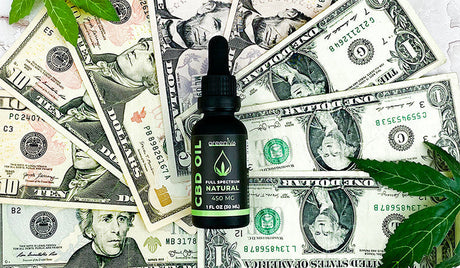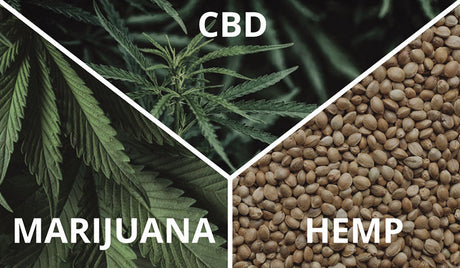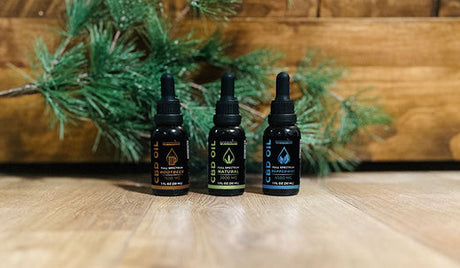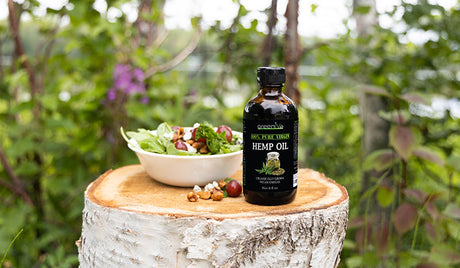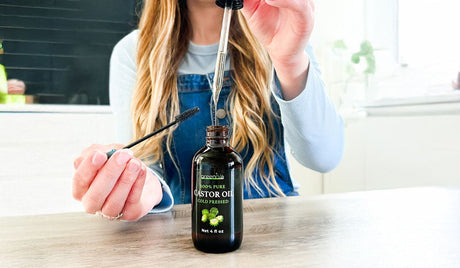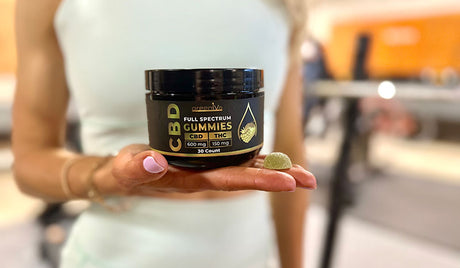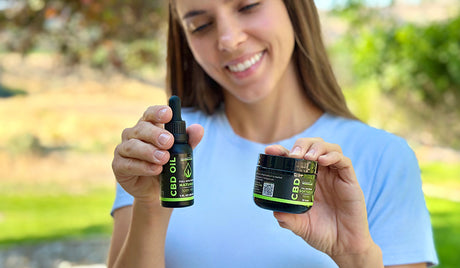Ever wondered what that feels like? We're not discussing the marketing buzz or the vague promises of "relaxation." We're diving deep into the real, subjective experiences of using different types of CBD products.
From the subtle calm of a tincture to the targeted relief of a topical, and even the buzzy world of CBD edibles, we're exploring how each delivery method interacts with your body.
If you are here, you are probably wondering what it feels like to take CBD oil. We plan to help you understand what you might expect on your CBD journey. Let's peel back the layers and get real about the sensations, the effects, and everything in between.
Understanding CBD
Before we start on what CBD feels like when you use it, here is a brief overview. CBD, or Cannabidiol, is one of the many chemical compounds, or cannabinoids, found in the cannabis plant.
CBD interacts with the Endocannabinoid System to provide therapeutic health benefits. It can assist with discomfort, sleep, and mood or mental health conditions.
The Endocannabinoid System
To understand what CBD feels like, we need to understand what it does within the body. Early studies showed that CBD interacts with the body's endocannabinoid system (ECS). When taken internally, CBD directly interacts with the ECS.
The ECS is responsible for helping the body stay in homeostasis or balance. The ECS helps with many different processes within the body to help maintain balance, including:
- appetite and digestion
- metabolism
- pain relief
- immune system responses
- reduce anxiety
- learning and memory
- motor control
- sleep
- cardiovascular system function
- muscle formation
- bone remodeling and growth
- liver function
- reproductive system function
- skin and nerve function

CBD may help the Endocannabinoid System keep the body in balance. It does this by stimulating the CB1 and CB2 receptors. When these receptors are activated, they send signals to the brain to make more endocannabinoids in the body.
These endocannabinoids then find the problem and do their best to fix it. This interaction may lead to feeling some relief from symptoms relating to mood, discomfort, and sleep.
Misconceptions About CBD
Now that we have some basic information about CBD, let's discuss some common misconceptions surrounding the topic. The main misconception surrounding CBD is that it is a psychoactive compound like its counterpart THC (Tetrahydrocannabinol).
THC is generally derived from the cannabis indica (Marijuana) plant and produces a "high" feeling for its users. This "high" feeling can cause hallucinations, impaired memory, altered senses, and the list continues. We feel that it's worth noting that not all THC's effects are bad.
CBD, on the other hand, does not produce any adverse effects and is generally derived from the cannabis sativa (Industrial hemp) plant. CBD is well known for its ability to assist with discomfort, mood, and sleep.
What Does It Feel Like To Take CBD?
Several factors can influence a user's experience with CBD, making it a unique and personalized journey for each individual. CBD can provide a unique and subtle experience as it interacts with the body's endocannabinoid system to promote balance and relaxation.
CBD can induce a gentle calmness that eases tension and soothes the mind when ingested. Many people describe the sensation as a wave of tranquility washing over them, melting away stress and promoting a general feeling of well-being.

As discussed above, it's not a psychoactive experience like that of THC, so there is no intoxication or impairment associated with CBD usage. However, some CBD products contain a high milligram amount of THC. Those types of CBD and THC products could cause psychoactive effects to occur.
Instead of getting high, CBD often leaves individuals feeling more centered and focused and able to navigate daily activities with a greater sense of clarity.
What Determines The Feeling We Get When Taking CBD?
The effects of CBD can vary depending on factors such as dosage, individual body chemistry, and the specific product used. Still, it offers a gentle and natural way to support overall wellness. Let's discuss what you must do to see the CBD effects on the body.
CBD Dosage and Potency
Dosage plays a crucial role in determining the effects of CBD. The optimal dosage varies from person to person, depending on factors such as body weight, metabolism, and desired outcomes. For example, a person with a higher body weight would have to consume more CBD per serving than those who naturally weigh less.
Experimentation with doses of CBD is recommended for first-time CBD users. We recommend that you buy an affordable form of CBD with a high dosage. That way, you can take less initially and steadily increase the amount until you find the sweet spot of relief you seek.
Types of CBD
CBD products come in three main types, each offering distinct benefits: Full-spectrum CBD includes all cannabis plant cannabinoids, including trace amounts of THC, maximizing the "entourage effect" for enhanced benefits.

Broad-spectrum CBD mirrors full-spectrum but removes THC, providing a similar entourage effect without the psychoactive component. CBD isolate, on the other hand, is pure CBD, isolating specific cannabinoids for targeted effects like CBG for calming, CBC for discomfort, and CBN for sleep.
Method of Consumption
The method of CBD consumption significantly impacts its onset and long-term duration. Oils and tinctures, taken sublingually, offer rapid effects as they directly enter the bloodstream, providing relatively long-lasting relief. CBD edibles, such as gummies, require digestion, leading to a delayed onset (up to two hours) but potentially longer-lasting effects, though some CBD may be lost during digestion.
Topical CBD products, like creams and salves, are applied directly to the skin for targeted relief. They offer quick results, ideal for specific discomfort, but their effects tend to wear off faster than ingested CBD.
Body Chemistry and Sensitivity
Furthermore, individual body chemistry and sensitivity to cannabinoids can impact the response to CBD. Some people may be more receptive to its effects, while others may require higher doses. When determining what works best for you, there may be some trial and error, but do that with your doctor.
Lastly, the quality of the CBD product itself is a significant factor. We feel that it is important to source CBD from reputable manufacturers that use high-quality hemp and employ rigorous testing to ensure purity and accurate labeling.
We recommend checking to see if the company does third-party drug testing on its CBD products. This can help to double-check the quality of each product. All these factors can help individuals personalize their CBD experience and maximize the user experience.
Sum It Up!
Answering our original question, what does CBD feel like? When you take CBD, you can expect a feeling of calm, peace, comfort, and more. You will only get high by taking CBD products if a large amount of THC is also included in the CBD product.
CBD can help in various ways; generally, only good and happy feelings are associated with CBD. On occasion, CBD users need to remember to check the THC levels of the CBD product they plan on purchasing before they run into issues. THC is safe to take at the federal legal level of less than 0.3%.
CBD products are generally formulated with a specific use in mind. If you need assistance with discomfort, there are carefully crafted CBD products designed to assist with comfort levels. Remember to thoroughly research the CBD product you plan on purchasing to ensure you know what effects may occur.
GreenIVe Cannabis Products



